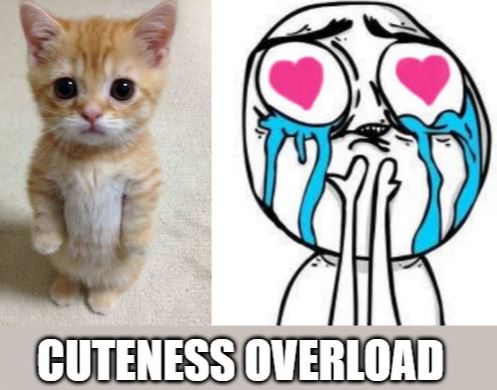What Is Cute Aggression?
Have you ever felt the uncontrollable urge to pinch, squeeze, or even bite something incredibly cute? Whether it’s a chubby-cheeked baby, a fluffy puppy, or a tiny kitten, this intriguing behavioral response is known as cute aggression. It’s the compulsion to squish, crush, or eat something adorable—without any actual desire to cause harm.
Cute aggression is a fascinating phenomenon that blends positive emotions with aggressive impulses, and it has captured the interest of psychologists across various fields, including clinical psychology, social psychology, and personality psychology.
The Science Behind Cute Aggression
Interest in "cute aggression" arose in large part courtesy of a poster presentation of research findings at the annual conference Society for Personality and Social Psychology in 2013, titled: "It’s So Cute I Want To Squish It! How Cuteness Leads To Verbal Expressions of Aggression," the research was conducted by Rebecca Dyer, Oriana Aragón, Chelcie Piasio, Margaret Clark, and John Bargh.
The study revealed two key findings:
1. Viewing cute (but not funny or neutral) animals predicted verbal expressions of aggression, mediated by a sense of loss of control.
2. After viewing cute images, participants were more likely to choose aggressive responses to end ambiguous stories.
In 2015 the authors research on cute aggression was published in the journal Psychological Science, under the title Dimorphous Expressions of Positive Emotion: Displays of Both Care and Aggression in Response to Cute Stimuli.
The media picked up on the study, and it even featured on the popular British comedy panel show QI, bringing cute aggression into the public spotlight.
Why Do We Experience Cute Aggression?
Cute aggression is a dimorphous expression of emotion, meaning it involves expressing an emotion that seems opposite to what we’re feeling. For example, crying when we’re happy or laughing when we’re nervous. In the case of cute aggression, the overwhelming positive emotions triggered by something adorable are balanced by an aggressive impulse.
According to Dyer et al, cute aggression serves as a form of emotional regulation. When positive emotions become too intense, they can feel overwhelming—even physiologically damaging. Cute aggression acts as a biological "pressure valve," helping to restore emotional balance. Noting that:
"It might be that how we deal with high positive emotion is to sort of give it a negative pitch somehow."
The Evolutionary Function of Cute Aggression
Cute aggression isn’t just a quirky human behavior—it may have deep evolutionary roots. Research suggests that the urge to "squish" something cute is linked to our caregiving instincts. When we see something adorable, our brains release a flood of dopamine, the "feel-good" chemical. This surge of positive emotion motivates us to care for and protect the cute thing.
However, if the emotions become too intense, the brain triggers a counterbalancing response—cute aggression—to prevent us from becoming overwhelmed. This ensures that we can effectively care for vulnerable beings, like babies or young animals, without being paralyzed by our emotions.
Teaching Ideas: Exploring Cute Aggression in the Classroom
If you teach psychology, cute aggression is a fantastic topic to engage your students. Here are some ideas to explore in the classroom:
1. Dimorphous Expressions of Emotion:
Ask students to brainstorm other examples of dimorphous expressions, such as tears of joy or nervous laughter. How do these behaviors help regulate emotions?
2. Cute Aggression Across Cultures:
Discuss whether cute aggression is a universal trait. For example, in the Philippines, the word "gigil" describes the overwhelming urge to pinch or squeeze something cute. Are there similar concepts in other cultures?
3. The Science of Cuteness:
Introduce students to Konrad Lorenz’s work on baby schema (Kindchenschema). Lorenz proposed that features like big eyes, round faces, and small noses trigger caregiving behaviors in adults. How does this relate to cute aggression?
4. Negative Emotions and Dimorphous Responses:
Explore whether dimorphous expressions also occur with negative emotions. For example, Fredrickson and Levenson found that people often smile while watching sad films. Why might this happen?
Conclusion: The Fascinating World of Cute Aggression
Cute aggression is a perfect example of how complex and surprising human emotions can be. By blending positive feelings with aggressive impulses, it highlights the intricate ways our brains regulate emotions. Whether you’re a psychology enthusiast, a teacher, or just someone who loves cute animals, understanding cute aggression offers a unique glimpse into the human mind.
About The Author
David Webb is the owner, writer and host of three websites built around his teaching and research interests; including All-About-Psychology.Com which receives over two million visits a year.
A passionate promoter of psychology through social media, over 850,000 people follow his psychology Facebook page and he is featured on the British Psychological Society list of the 100 most followed psychologists and neuroscientists on Twitter.
A bestselling author, his published work includes: The Psychology Student Guide - The Incredibly Interesting Psychology Book and, On This Day in Psychology.
Recent Articles
-
Psychological Impact of Catastrophic Injury & Recovery
Feb 17, 26 02:26 AM
Explore the psychological impact of catastrophic injury, including trauma, identity shifts, resilience, and long-term mental health recovery. -
Psychology Articles by David Webb
Feb 10, 26 06:31 AM
Discover psychology articles by David Webb, featuring science-based insights into why we think, feel, and behave the way we do. -
Music and Memory: How Songs Shape Identity, Emotion, and Life Stories
Feb 10, 26 06:25 AM
How music and memory intertwine to preserve identity, evoke emotion, and anchor life stories. A psychological look at playlists, nostalgia, and the brain.
Please help support the website by visiting the All About Psychology Amazon Store to check out an awesome collection of psychology books, gifts and T-shirts.





